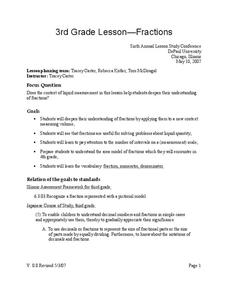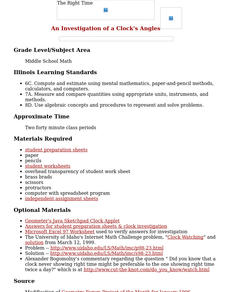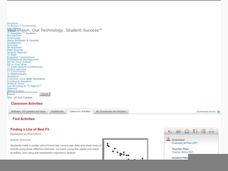Curated OER
By The Pound
Students develop mathematical skills using measurement in the form of weight. They also perform calculations to find cost and strengthen estimation skills while comparing the actual price. The context for the lesson is in the industry of...
Curated OER
Fractions
Students practice measurement. In this fractions lesson, 6th graders measure volume of a liquid, e.g. 1/5 liter, and learn the vocabulary of fractions (numerator, denominator). Students solve sample problems in small...
Curated OER
How to Figure Board Feet and Cost of a Board
Students investigate woodworking and converting lengths to cubic measurements. In this math conversions instructional activity, students examine the length of a piece of board, and its total area by using the formula for finding...
Curated OER
Redesigning the Classroom
High schoolers redesign the classroom space. In this geometry lesson, students part take in making classroom rules and assigning value to the space in the classroom. They investigate measuring and problem solving in this lesson.
Curated OER
Scale Drawings
Young scholars discuss the importance of scaling drawings. In this math lesson, students create a scaled drawing of circuit boards. They explain why accuracy is very important when scaling.
Curated OER
The Right Time
Students compute and estimate using mental mathematics, paper-and-pencil methods, calculators, and computers. They measure and compare quantities using appropriate units, instruments and methods. They utilize worksheets imbedded in this...
Curated OER
Ag In The Outfield
Young scholars explore baseball. This is a cross-curricular plan that includes math, history, and agriculture. Pupils use their five senses to observe the materials a baseball is made from and identify the agricultural products used. In...
Curated OER
Cool Times with Heat
Students work with thermometers to complete problems about temperature. They investigate cooling patterns, how location affects temperature, and what happens when water having different temperature is mixed. They measure temperature in...
Curated OER
Trends of Snow Cover and Temperature in Alaska
Students compare NASA satellite data observations with student surface measurements of snow cover and temperature. They practice data collection, data correlations, and making scientific predictions.
Curated OER
Ice is N"ICE"!!
Students observe and describe, both orally and in writing. the different forms of water on the surface of the Earth and measure the approximate size of an iceberg. They also estimate and measure the amount of ice that floats above the...
Curated OER
Introducing Angles
Sixth graders identify, compare and interpret the characteristics of polygons and angles in order to meet spatial sense, geometry and measurement standards. They also sort shapes into three categories, polygons (regular and irregular)...
Curated OER
How Big Is It?
Fifth graders look at the Garrison flag and estimate how big it is. In this measurement lesson plan, 5th graders then calculate the area and perimeter of the flag.
Curated OER
The UPS Experiment
Students calculate the speed using metric measurements. In this geometry lesson, students calculate speed, distance and velocity using metric measurements. They gain inquiry and problem solving skills in this assignment.
Curated OER
Altimetry
Fifth graders accurately measure the distance to eight points on an uneven surface by conducting a simulation of sattelite altimetry. They create a two-dimensional model of the simulated ocean surface by graphing data from the Radar Run...
Curated OER
Finding a Line of Best Fit
Pupils engage in the practice of creating a scatter plot with the data obtained from measuring different resting heart rates. The data is used to create the table that is translated into a graph. The lesson plan gives instructions for...
Curated OER
Computer Graphing
Students research the Internet or create surveys to find graphable data. They collect, organize, analyze and interpret the data. Finally, they choose the appropriate type of graph to display the data and find the measures of central...
Curated OER
Seesaw Balances
Students determine how the weights of 7 objects on a seesaw can vary and still be in balance. They also write equations in algebraic terms, how to change 3 variables in an equation expressed in algebraic terms to obtain the correct...
Curated OER
Writing in Scientific Notation
Learners discover number sense by completing a math worksheet. In this scientific notation lesson, students identify the purpose for writing in scientific notation and practice writing large numbers in scientific notation. Learners...
Curated OER
Hoping Backward to Solve Problems
Young scholars use number lines to compare differences. In this math lesson, students use a number line to solve problems. Young scholars predict differences and answer puzzles using subtraction.
Pennsylvania Department of Education
Using the Number Line to Compare
Students determine differences using a number line. In this math lesson, students use the number line to solve subtraction problems. Students solve puzzles using subtraction.
Curated OER
Where in the World is Tacky the Penguin?
First graders complete activities related to they story they are reading in class. Through art and measurement activities, 1st graders relate a story from the "Tacky the Penguin Series" to everyday objects and ideas they encounter.
Curated OER
Surveying: 19 Chains and 50 Links
Through an interdisciplinary lesson, emerging engineers explore the history of surveying systems. After discussing various systems, they perform surveys on printable pages. Using their geometric skills, they physically stake out plots...
Curated OER
Economics and emissions
Eighth graders produce a manufactured good and monitor energy consumption. In this Math lesson, 8th graders practice their basic math and accounting skills. Students participate in a business simulation.
Curated OER
Introducing Trigonometry
Eleventh graders explore the three basic trigonometric functions. In this trigonometry/Algebra II lesson, 11th graders use GeoGebra and the unit circle to define the ratios of sides is a right triangles as they examine the full domain...























